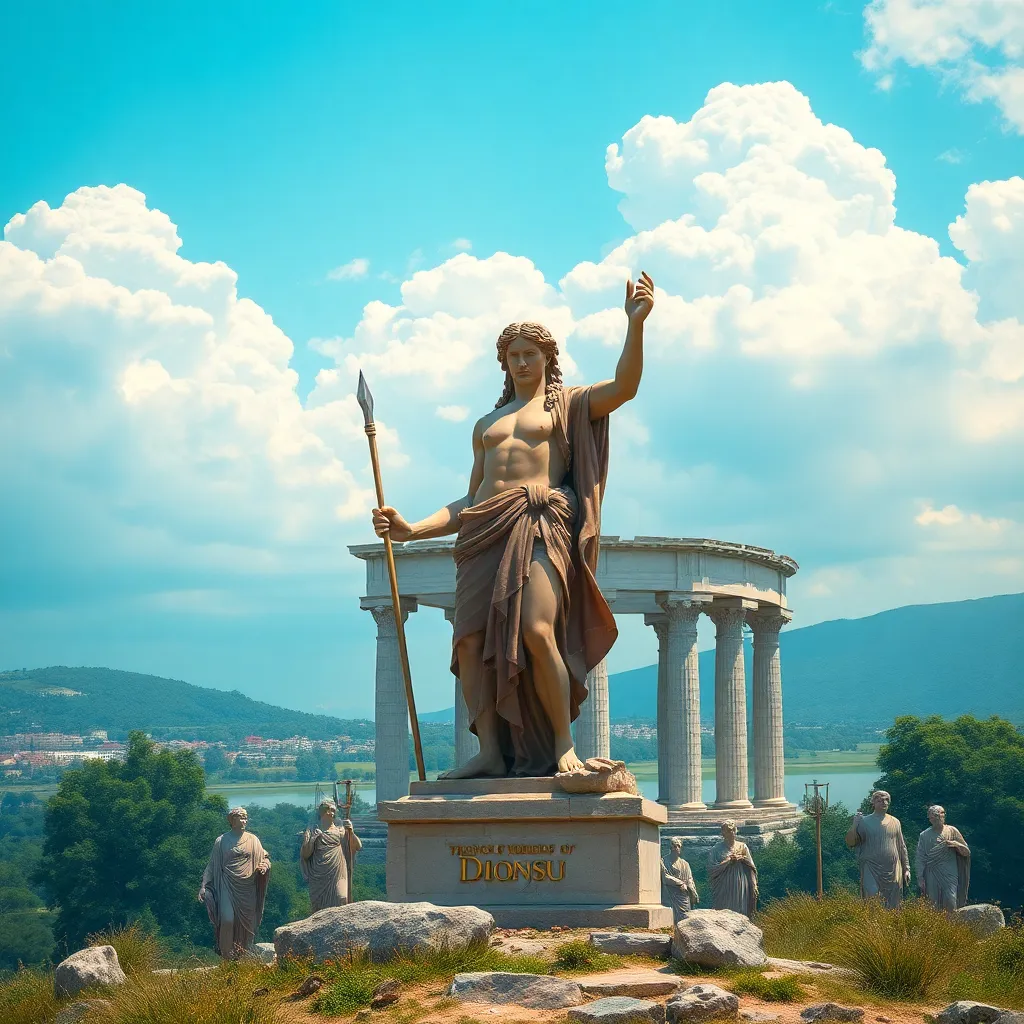The Festivals of Dionysus: From City Dionysia to Rural Dionysia
I. Introduction to Dionysian Festivals
Dionysus, the ancient Greek god of wine, fertility, and theater, holds a significant place in Greek mythology and culture. Celebrated for his dual nature, he embodies both the joyous and chaotic aspects of life. Festivals dedicated to Dionysus were integral to ancient Greek society, serving as a means of communal celebration, artistic expression, and religious devotion.
The festivals not only honored the god but also reinforced social bonds and provided a platform for the arts, particularly the theatrical performances that have influenced Western culture for centuries. This article delves into the rich history and significance of the festivals of Dionysus, from the grand City Dionysia in Athens to the more localized Rural Dionysia.
II. Historical Context of Dionysian Festivals
The worship of Dionysus emerged in ancient Greece during the Geometric period (circa 900-700 BCE), gradually evolving into organized festivals. These celebrations were deeply connected to agricultural cycles, particularly the harvest, as Dionysus was also associated with fertility and the abundance of nature.
As the festivals developed, they transitioned from small, local gatherings to large, city-wide events that showcased the cultural and artistic achievements of the Greek people. This evolution reflects the growing complexity of Greek society and the importance placed on communal celebrations.
III. The City Dionysia: A Celebration of Urban Culture
The City Dionysia, held annually in Athens during the spring, was one of the most important festivals in honor of Dionysus. It featured various events, including dramatic competitions, parades, and religious rituals that drew participants from across the city-state.
- Drama Competitions: Playwrights competed by presenting their tragedies, which were judged by a panel. Notable playwrights such as Aeschylus, Sophocles, and Euripides debuted their works during this festival.
- Parades: A grand procession marked the beginning of the festival, featuring participants dressed in elaborate costumes, musicians, and dancers.
- Rituals: The festival included sacrifices to Dionysus, prayers, and offerings, emphasizing the religious aspect of the celebration.
The City Dionysia was crucial for Athenian identity and democracy, providing a space for citizens to engage with art and politics, fostering a sense of community and shared values.
IV. The Rural Dionysia: A Celebration of Agrarian Life
In contrast to the City Dionysia, the Rural Dionysia was celebrated in the countryside and held during the winter months. This festival was more localized, emphasizing the agricultural roots of Dionysian worship.
- Local Significance: The Rural Dionysia allowed rural communities to honor Dionysus and celebrate the fertility of the land. It reinforced local traditions and customs.
- Activities and Rituals: Events included feasting, singing, dancing, and the performance of rustic plays. Villagers would often engage in communal activities that brought them together.
- Community Role: The festival played a vital role in maintaining Dionysian traditions, ensuring that the worship of Dionysus remained a vibrant part of rural life.
V. Theatrical Innovations and Contributions
The City Dionysia significantly impacted the development of Greek theater, transforming it from simple rituals into a sophisticated art form. This period saw the emergence of notable playwrights who made lasting contributions to drama.
- Aeschylus: Often regarded as the father of tragedy, Aeschylus introduced the second actor, allowing for more complex narratives and character interactions.
- Sophocles: He added a third actor and developed the use of scenery, contributing to the dramatic structure we recognize today.
- Euripides: Known for his innovative storytelling and complex characters, Euripides shifted the focus of tragedy to human emotions and moral dilemmas.
This transition from religious festivals to theatrical performances laid the groundwork for modern drama and continues to influence contemporary theater.
VI. Rituals and Symbolism in Dionysian Festivals
The rituals associated with the Dionysian festivals were rich in symbolism and meaning. Key elements included:
- Processions: These lively parades symbolized the arrival of Dionysus and the fertility he brought, often featuring participants dressed as satyrs and maenads.
- Sacrifices: Animals, particularly goats, were sacrificed to honor Dionysus, representing both death and rebirth, a central theme in his mythology.
- Revelry: The festivals encouraged ecstatic celebration, with wine flowing freely, fostering a sense of community and shared joy among participants.
Wine, masks, and theatrical performance served as symbols of transformation and liberation, allowing participants to escape the constraints of everyday life and engage in a collective experience of joy and creativity.
VII. The Decline and Legacy of Dionysian Festivals
The decline of Dionysian festivals began in the Hellenistic period, influenced by various social and political changes. Factors contributing to this decline included:
- Political Transformation: The rise of new political powers and the spread of Hellenistic culture shifted the focus away from traditional Athenian practices.
- Religious Shifts: The introduction of new religions and philosophies led to a decline in the popularity of older rites.
Despite their decline, the themes and motifs of Dionysian festivals persisted in later cultural contexts, influencing the development of Roman theater and Renaissance drama.
Today, the legacy of Dionysus can be seen in modern theater, literature, and various festival practices that celebrate community, art, and the human experience.
VIII. Conclusion: The Significance of Dionysian Festivals Today
The festivals of Dionysus were more than mere celebrations; they were vital expressions of cultural identity, artistic innovation, and social cohesion in ancient Greek society. Reflecting on these festivals today reveals their enduring relevance in contemporary arts, theater, and community celebrations.
As we continue to explore and celebrate the legacy of Dionysus, we are reminded of the power of communal experiences, artistic expression, and the joy of revelry in our lives. The spirit of Dionysian festivals lives on, inspiring modern interpretations and celebrations that connect us to our shared cultural heritage.




